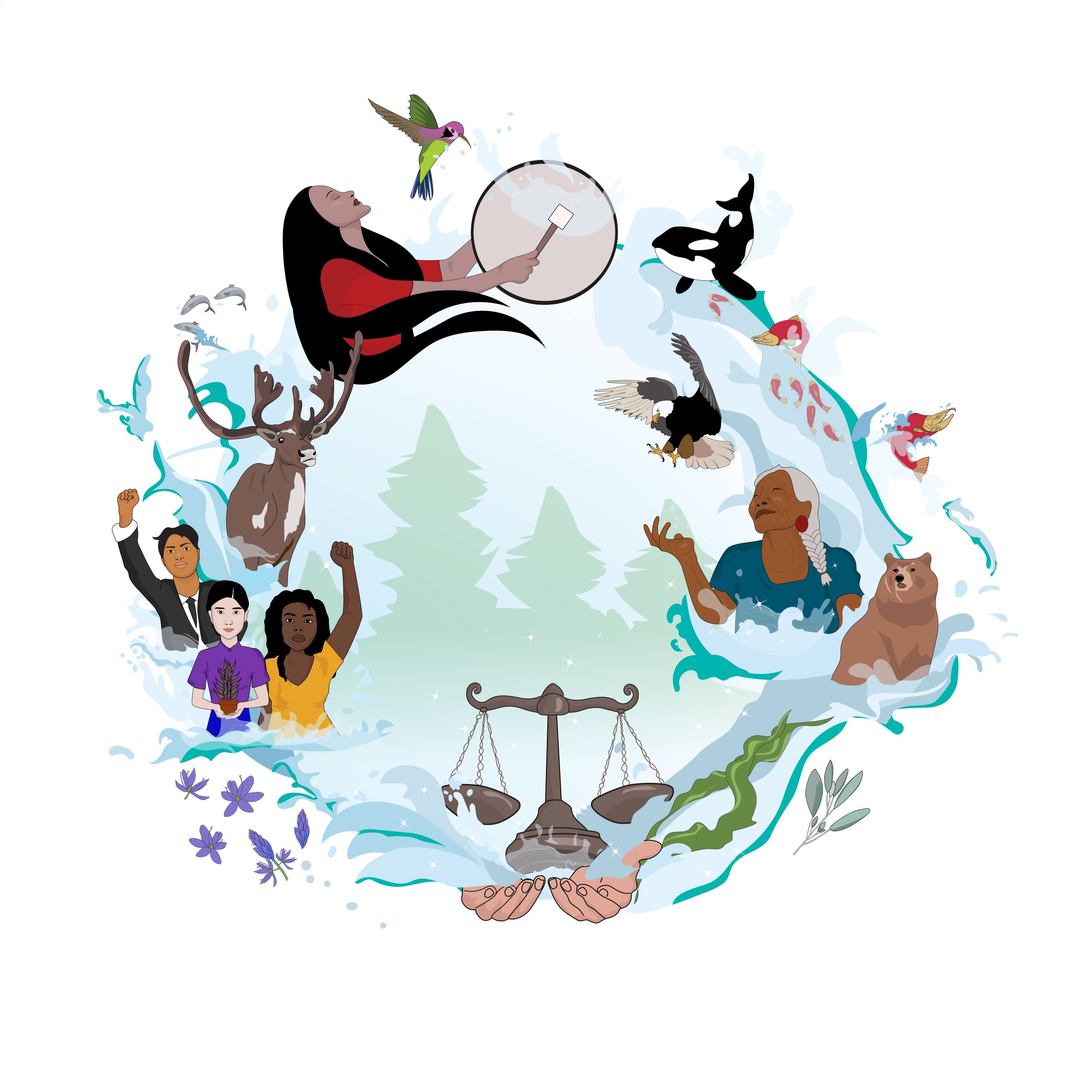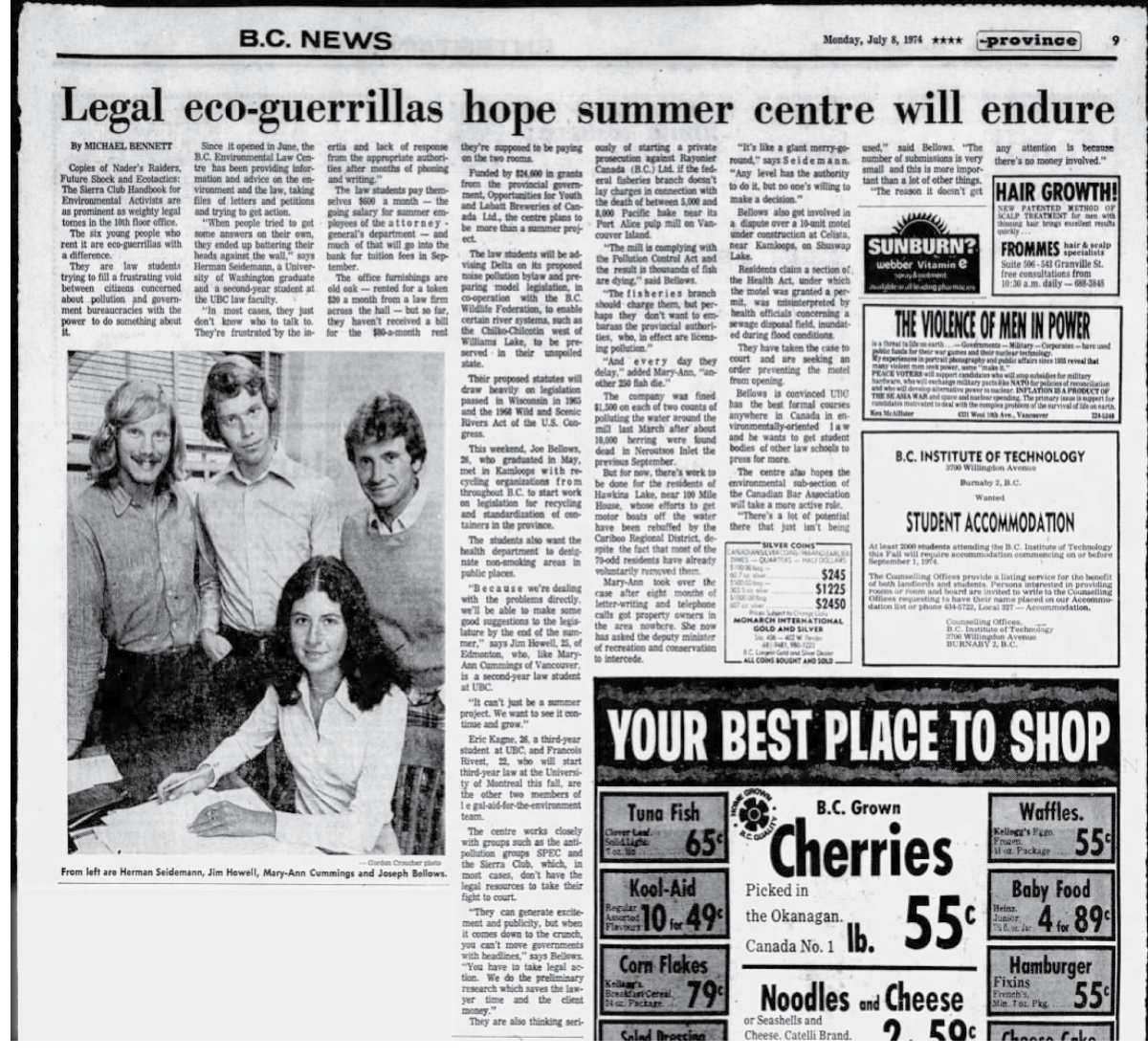
Fifty years ago, a dedicated group of law students came together to kick off an innovative summer project: providing legal information and advice to residents concerned about environmental problems.
These six students, from the University of British Columbia and University of Montreal, were the young legal minds behind what would later become West Coast Environmental Law.
In June 1974 they set up shop in a small office downtown Vancouver, determined to “fill a frustrating void between citizens concerned about pollution and government bureaucracies with the power to do something about it.” They provided support to folks across the province dealing with an array of environmental challenges, such as advising governments on recycling legislation, advocating for non-smoking designations in public spaces, and demanding enforcement when fish were killed due to pollution near a pulp mill.

Initially known as the BC Environmental Law Centre, the hub was originally envisioned as a temporary project for students over the summer, but it quickly became clear that there was an ongoing need for legal services in support of environmental and community health in BC. This humble student-run law clinic eventually grew into the three sister organizations now known as “West Coast.”
Read more about our story here.
Throughout West Coast’s history, we’ve been committed to transforming the legal landscape in ways that are more sustainable, more democratic and more just. As we celebrate our 50th anniversary, we’re reflecting on five key moments that have made the organization into what it is today.
Five key moments in West Coast Environmental Law’s history
1) The First Wave: Shaping BC and Canada’s Environmental Legal Safety Net
Since our inception, throughout the 1980s and 90s – and to this day – West Coast lawyers have contributed to a plethora of important law reform initiatives that helped to transform and strengthen environmental decision-making in BC and Canada.
Considering that many of the Crown laws that govern environmental issues were originally created not to protect the environment but to facilitate resource development, our advocacy has been essential in establishing and improving federal, provincial and local laws so they work for nature and communities.
This includes creating new laws and regulations, as well as ensuring that existing laws are strengthened and enforced to support the long-term health of land, air and water. From contributing to the creation of the BC Environmental Appeal Board and passing of the Environment Management Act in 1981 (and subsequent campaigns to secure regulation of contaminated sites and pulp mill pollution under this Act), to playing a lead role in the establishment of the Canadian Environmental Protection Act (1988), Canadian Environmental Assessment Act (1992), and the BC Environmental Assessment Act (1995), West Coast’s early law reform wins helped to shape the vital advocacy work we continue to do today.
2) Promoting Access to Environmental Justice: The Launch of the Environmental Dispute Resolution Fund
From the beginning, one of West Coast Environmental Law’s core objectives has been to promote access to environmental justice in BC, and to reduce barriers for individuals, community groups, and First Nations seeking legal help to address environmental challenges. To help meet the growing need for these services across the province, West Coast’s former Executive Director Bill Andrews approached the Law Foundation of BC with a proposal to establish an innovative new approach to environmental legal aid, and in 1989 the Environmental Dispute Resolution Fund (EDRF) was established.
For the past 35 years, West Coast has administered this one-of-a-kind legal fund which provides grants for community efforts to defend the health of the environment and build a more sustainable British Columbia with the assistance of a network of EDRF lawyers around the province.
Through our Access to Justice programs, we have partnered with thousands of community members, grassroots groups, environmental organizations, and First Nations to support environmental protection in every corner of the province – helping them understand their legal options, negotiate solutions, and advance environmental protection through law before many levels of court and government tribunals. We have distributed approximately $6 million in grants to a diverse range of clients, ensuring that they have a voice in environmental decision-making.
To read more about the impact of the EDRF, see our report From the Ground Up: Celebrating 30 years of the EDRF.
3) Supporting Community Resistance to Oil Pipelines & Tankers, Catalyzing Climate Action
In 2005 and 2006 West Coast facilitated a strategy development conversation among groups across Canada aimed at weaving together climate, oceans and lands-related campaigns into a coordinated effort to address Canada’s fastest growing source of greenhouse gas pollution – the Alberta tar sands – and to protect lands and waters from the risks of oil spills, counter the influence of the oil and gas industry, and catalyze climate action.
On the ground during the 2000s and 2010s West Coast was deeply involved in community-led campaigns to protect lands and waters from the risk of oil spills. We dedicated more than a decade to a legal campaign to oppose the Enbridge Northern Gateway pipeline and tankers project – which would have transported tar sands oil from Alberta to a supertanker terminal in Kitimat, BC, increasing oil spill risks and jeopardizing the health of the northern Pacific coast.
In 2016, after a lengthy legal battle in partnership with our Indigenous clients and many other allies, we were successful in overturning the federal approval for Northern Gateway. Then, in 2019, we celebrated the passing of the federal Oil Tanker Moratorium Act, after decades of work to permanently protect BC’s north coast from oil tankers through legislation.
The lessons we learned fighting Northern Gateway were instrumental as we continued our work supporting communities to protect land, water, and the climate from other fossil fuel megaprojects such as the Trans Mountain Pipeline Expansion (TMX). In turn, pipeline campaigns provided critical leverage for federal legal and policy action on climate and rebuilding federal environmental laws. Our work pressing for climate accountability and legal solutions for ocean protection continues today.
4) Enviro Laws Matter: Building Next Generation Environmental Laws
Following a decade of deregulation in BC, in 2012, many of Canada’s most significant environmental laws were also dismantled to pave the way for resource development. The sweeping changes removed legal protections of many ecologically important places, and diminished Canadians’ ability to participate in environmental decision-making.
In response, West Coast launched a national campaign aimed at creating lasting understanding among Canadians about the importance of environmental laws. This “ground-up” law reform initiative provided educational resources and tools to put the law in the hands of communities, building a broad network of people who will continue to stand up and raise their voices in defence of strong environmental laws.
As a result of our work, thousands of community members and experts had their voices heard in the process of rebuilding Canada’s environmental laws – and in 2019 the federal government passed a new Impact Assessment Act, a modernized Fisheries Act and Canadian Navigable Waters Act, an amended Oceans Act and a reformed Canadian Energy Regulator.
Our lawyers played a leadership role, supporting informed community participation, convening leading experts, submitting briefs, testifying before committees, meeting with government officials and collaborating with allies. Closer to home, West Coast also worked in coalition with other NGOS and for Indigenous clients in securing a new and improved BC Environmental Assessment Act which came into force in 2019.
While there is still much work to be done to strengthen these and other key laws, our efforts helped secure tangible improvements as well as commitments from the federal and provincial governments to further strengthen legal safeguards for the environment and to undertake the crucial work of aligning laws with the UN Declaration in cooperation with Indigenous peoples.
5) Upholding Inherent Title and Rights, Living Indigenous Law
At the heart of our work, West Coast recognizes the jurisdiction and laws of Indigenous peoples who have actively governed their territories for millennia – and we acknowledge the integral role that their stewardship has played for generations in supporting the health of the lands and waters we all rely on. Providing legal and strategic support to Indigenous nations researching, applying and enforcing their own laws for land, air, water and communities is a core focus of our work.
Drawing on the lessons learned over two decades of work with Indigenous peoples on Indigenous law-based approaches to land use planning, impact assessment, resisting unsustainable development and other aspects of environmental governance, in 2016 West Coast launched the RELAW program (Revitalizing Indigenous Law for Land, Air and Water).
Through RELAW projects, West Coast lawyers collaborate with Indigenous partners revitalizing their laws to address pressing environmental challenges, providing pro-bono legal services to support in achieving their goals. To date, we have worked with over a dozen RELAW partners on a variety of different projects to apply their own laws to decision-making in their territories, such as fisheries governance, impact assessment and Indigenous protected areas.
Alongside RELAW projects, we have also welcomed seven cohorts of Indigenous participants to the RELAW Co-learning Program, a unique capacity-building program that brings together Indigenous individuals and allied staff to build knowledge, methods and skills for revitalizing, applying and enforcing Indigenous law.
The RELAW Program is central to West Coast’s commitment to decolonize the legal landscape – working toward a future in which Indigenous law (re)takes its rightful place for the benefits of generations to come.
Looking ahead at the next 50 years
At West Coast, what began as a temporary legal student project continues to thrive as an organization today, thanks to the hard work and support of our 30 dedicated staff members, our board of directors, as well as our incredible volunteers, donors, funders and supporters. We believe in using the power of the law to address environmental challenges – because it works.
Holding corporations and governments to account takes time, and the last 50 years have shown us that with determination, expertise, and collaboration with a diverse spectrum of allies, we can achieve successes that help make the world more sustainable and just.
We have hope for the next 50 years. We know that we are not alone in this, and we look forward to working with our partners to turn that hope into action, and meaningful change.
We hope you will join us.
Artwork by Karissa Chandrakate / Instagram: @pangea1010
Drawing on themes and values at the heart of West Coast’s work – such as justice, decolonization, and the interconnectedness of ecosystems and our communities – this unique piece of artwork was created in celebration of our 50th Anniversary. The piece illustrates our vision for a more just and sustainable world, through solutions that braid Indigenous and Canadian law. View the full illustration.